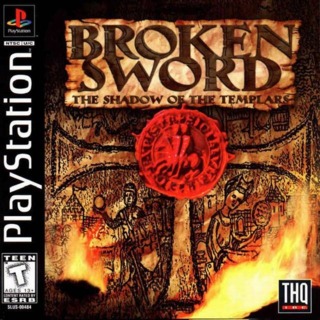A Knights Templar tale at its wisecracking best.
After the introduction, reminiscent of Disney's classic animations with sweeping vistas and sweeping orchestral score, the game begins in a literally explosive fashion, as main character George Stobbart is interrupted in his morning coffee by a bomb going off inside a café, complete with a suspicious looking clown making a break for it. The game begins with George shaking himself off after the explosion, and immediately the detective work gets into full swing. Is anyone alive in the café? Who was the terrorist? Why did he attack the café? Soon enough the conspiracy unravels into biblical proportions, and it seems inevitable that you can't escape until you solve the mystery once and for all.
Luckily, George is the man you will accompany through the thick of the plot. Being an American tourist in foreign land, the customs he faces and cultures he learns about are remarked with wit and cunning that'll make you want to click everything you can observe. Zany characters were all the rage in 90's graphical adventures, so Stobbart, a more realistic, relatively down-to-earth guy, has been heavily underrated for a long time. Accompanying George is French journalist Nico Collard. She is to George what Elaine Marley is to Guybrush Threepwood, and she's a much needed antidote to George's constant pessimism.
George's journey will take you across places such the city of Paris, a sleepy town in Ireland, and a villa in Spain, all with unique, logic-based puzzles which aren't too frustrating to figure out on your own. A lot of the puzzles are contextually mundane, but very amusing. For example, one requires you to distract someone guarding a dig site, and all it takes is some cleverly timed phone calls to Nico for you to get through.
Like a movie with inevitable goofs, adventure games always have the inevitable trial-and-error puzzle, a sequence (or two) overlooked because after spending months making the game, all the puzzles seem logical to the developers. Broken Sword, like the best in the genre, has one such moment in its sixth act in Syria, where you absolutely must observe something with a right-click, despite being able to make ample observations with a left click. It seems minor, but after hours of finding clues around the world, you're stumped by a single mouse clicking requirement, and you'll likely spend an hour going back and forth trying to find out what you missed.
Low resolution aside, it is amazing to think that even a decade and a half later, Broken Sword's graphics look as vibrant and youthful as ever. The hand-drawn, cartoon art direction is animated meticulously, and the frame compositions give it that cinematic edge. Perhaps the game could do with a high resolution spruce up, but apart from that, I cannot find another game that has withstood the test of time as well as Broken Sword. And while the audio sounds ridiculously compressed by today's standards, the voice acting (exaggerated accents aplenty), ambience, and instrumental interludes add to the already visually charged atmosphere. Those of you who have only played the non-CD version should do well to replay the game with all its auditory pleasures.
Are there any niggles that stop it from being the best it could possibly be? For one, the game is sluggishly paced, even for old game standards. It seems that the plot is always just behind the action, and while many people will accept that and instead concentrate on the game's other narrative achievements, adrenaline junkies would be warned to approach this game with caution. Also, many adventure gamers loathe the idea of dying in the genre, and Broken Sword has taken some bold decisions to include missteps that does involve death. The problem is not so much the idea of death, but rather the game is at a crossroads in trying to warn you about your impending doom. For one, George is always at mortal peril, so you'll take the idea of death by your stride, thinking that if ever George should face death, the narrative will keep him from doing so. When it happens, you're left wondering why did he kick the bucket now as opposed to several scenes ago when he was trapped inside a sarcophagus? It makes the idea of death feel contrived and gimmicky.
But the annoyances are slight. The fact of the matter is Broken Sword: Shadow of the Templars is a game any adventure aficionado should play. Newcomers to the genre would also do well in starting here, and those who are tired of current mainstream genres and want to try something different should also look this way. It's seriously good stuff that you may find yourself coming back to once every few years.

